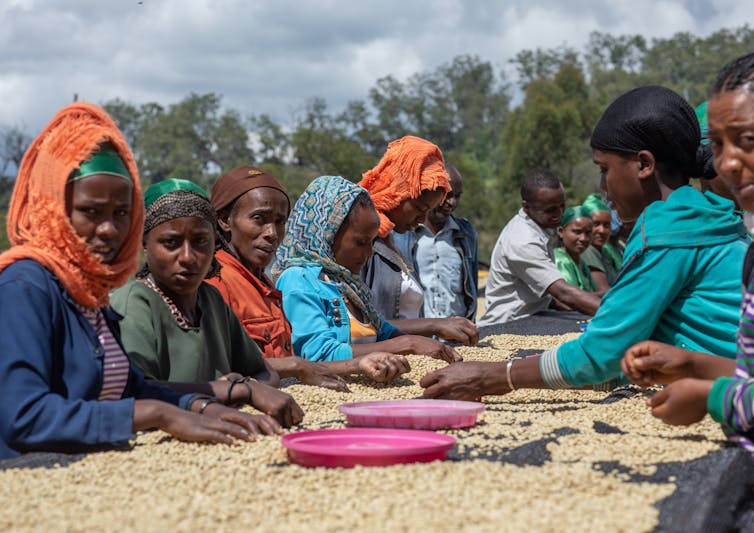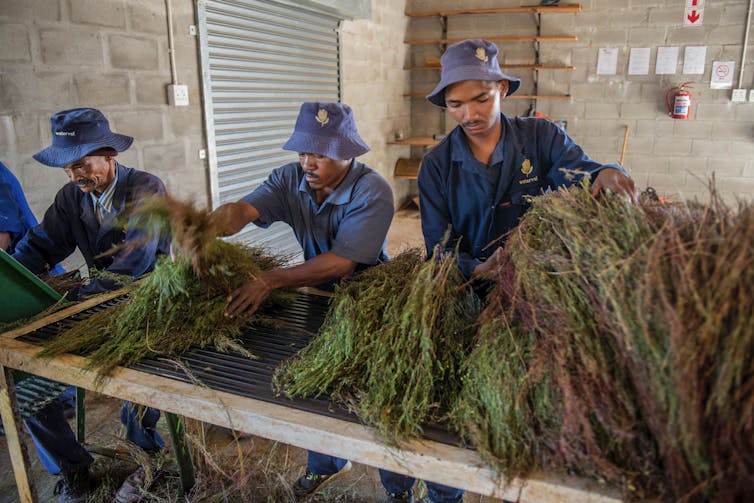https://theconversation.com/why-it-pays-to-link-products-to-places-and-how-african-countries-can-do-it-151511
-Samuel Samiai Andrews
Around the world, people commonly associate certain foods and products with particular geographical areas. These products are known for characteristics like aroma, flavour, and the traditional knowledge systems used to make them. Legal and agricultural scholars speak of these characteristics as terroir.
For example, coffee from Ethiopia’s Yirgacheffe, Sidamo and Harrar regions is famous for its quality. The Ijebu people of western Nigeria call their processed cassava Ijebu garri. Roquefort cheese and Darjeeling tea are also products associated with certain places.
These kinds of products, which have characteristics unique to their source, can be identified and protected by a type of intellectual property right called Geographical Indications (GI). This right gives economic and financial advantages to the place of origin. The products can be registered with a global treaty registry like the World Intellectual Property Organization. This helps to counter fake products in the international market.
Developed economies, especially in Europe, have benefited from GI protection and promotion since 1994, when they adopted the Agreement on Trade-Related Aspects of Intellectual Property Rights. And as early as 1883, the geographical origin of products was recognised as as aspect of industrial property in the Paris Convention for the Protection of Industrial Property. It accords them protection due to their value in national economic growth.

According to a 2020 European Commission study, Europe’s economy gained about 75 billion euros in the 2017 sales value of GI products. This means GI products accounted for 7% of the total sales value of Europe’s food and drink sector. The study also shows that the sales value of GI products doubled on average, when compared with similar products without GI certification. People attach value to buying authentic products from their sources.
As a predominantly agrarian region, Africa could adopt this strategy to boost the economies of rural communities. The second phase of the African Continental Free Trade Agreement (AfCFTA) focuses on intellectual property rights and trade. It’s an opportunity to take steps towards recognizing the economic value of GI.
Treaties
There are two main treaties currently regulating Geographical Indications. They include the Lisbon Agreement for the Protection of Appellations of Origin and Their International Registration (Lisbon Agreement), and the Geneva Act of the Lisbon Agreement on Appellations of Origin and Geographical Indications (the Geneva Act). Together, they are called The Lisbon System.
Most African countries have not signed these GI treaties. Accession to these treaties carries political and economic benefits. Not even Ethiopia and Nigeria – countries with great agricultural potential – have done so. GI status attracts higher revenue streams because of the customary assumption of quality that accrues to these products.
Joining the Lisbon Agreement and the Geneva Act would aid African countries in extending their products beyond their shores. Member countries have treaty obligations to protect GI products from misappropriation and abuse.
For example, Oku white honey from Cameroon, South African Rooibos tea and South African lamb are certified GI products. They enjoy protection outside the continent, leading to enormous financial benefits to their places of origin.
The local producers of GI products and services have inadequate knowledge of intellectual property and economics. Identifying GI products and including them in a formal database requires learning and experience. Therefore, private and public institutions should intervene in guiding producers and farmers. They can do this through the formation of cooperatives and educating members about GI. Producers and farmers should form GI management organisations to help members manoeuvre through the legal landscape. These include registration of products and collection of royalties and licensing revenues.

African nations should also streamline their regional intellectual property bodies. Two major African IP regional bodies – the African Intellectual Property Organisation and the African Regional Intellectual Property Organisation – could be merged into a single organisation for efficiency. The Anglophone and Francophone dichotomy in African intellectual property rights management shouldn’t exist. With the AfCTA encouraging a single trade market, a divided IP regional management structure may not be effective.
Nigeria and Ethiopia, like most African countries, do not have a single governmental institution that deals with GI. Although Nigeria’s trademark laws regulate registration, they do not cover GI registry. Ethiopia does not have any law for geographical indications nor a registry.
A specialised governmental office should regulate GI in each African country. For example, Zimbabwe has its Geographical Indication Act. South Africa has its Geographical Indications Regulation of 2019. It sets up its GI registry and guidelines to protect GI agricultural products.
African countries could position GI to help global IP rights enforcement for developing economies. Registration and export of GI products will improve the economy of rural African communities.